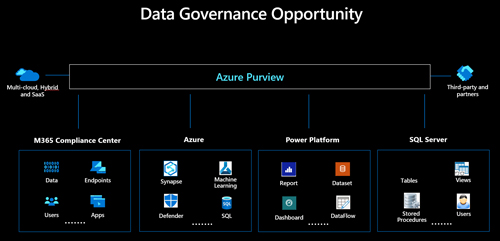News
Microsoft Announces Milestones for Data Tools Azure Synapse and Azure Purview
- By Kurt Mackie
- December 03, 2020
Microsoft this week described release milestones for several of its emerging cloud data management products.
Azure Synapse Analytics and Azure Synapse Studio are now generally available (GA) while a new data governance solution, Azure Purview, has been released as a preview.
The two announcements were prefaced by an online event on Thursday (soon available on-demand) that was fronted by Microsoft CEO Satya Nadella, who talked about the future of data and analytics in general, and the need for digital transformation in organizations. To get there, "tech intensity" will be needed, which involves adopting technology, building a technology capability and gaining trust in business alignment. This tech intensity will help empower employees, optimize operations, secure supply chains and transform business models, he argued.
Azure Synapse Analytics was introduced a year ago by Nadella at Microsoft's Ignite event. Formerly known as "Azure SQL Data Warehouse," Azure Synapse Analytics was redesigned to bolster the number of queries that could be run, while also adding a connection to Apache Spark. Now, the Azure Synapse Analytics product is commercially released.
Organizations using Azure SQL Data Warehouse don't have to move to Azure Synapse Analytics, though.
"If a customer does not want to use Azure Synapse at GA, they will be able to continue using their existing data warehouses, operations, automation, and tooling in dedicated SQL pools (formerly SQL DW) with no changes," Microsoft indicated in a Q&A session on Thursday.
The use of Azure Synapse Analytics requires having an Azure Data Lake Generation 2 account, Microsoft indicated. It serves as the default storage space.
Azure Purview Preview
The Azure Purview preview, which went by the internal Microsoft code name of "Project Babylon," is separate product that can be used with Azure Synapse Analytics. Azure Purview is new data governance solution that's integrated with the Microsoft Information Protection service. It relies on the same "sensitivity labels" approach of Microsoft Information Protection to classify an organization's data.
Microsoft suggested that Azure Purview can help protect data handled by non-Microsoft products, as well:
By extending Microsoft Information Protection's sensitivity labels with Azure Purview, organizations can now automatically discover, classify, and get insight into sensitivity across a broader range of data sources such as SQL Server, SAP, Teradata, Azure Data Services, and Amazon AWS S3, helping to minimize compliance risk.
Microsoft began working on Azure Purview after it introduced Azure Synapse Analytics last year. Azure Purview can work with other cloud-based and on-premises solutions, but it's also integrated with the Microsoft 365 Compliance Center, various Azure services, the Power Platform and SQL Server, according to a Microsoft-produced chart.
 [Click on image for larger view.] Microsoft chart illustrating Azure Purview data governance across cloud and on-premises solutions.
[Click on image for larger view.] Microsoft chart illustrating Azure Purview data governance across cloud and on-premises solutions.
The availability of the Azure Purview preview was described during the Q&A portion of the talk. Here's that description:
Azure Purview metadata storage is currently available in 5 Azure regions (East US, East US 2, West Europe, South East Asia, Brazil South) and in-region scanning from 16 Azure regions including North Europe. Our goal is the make the metadata storage also available in North Europe by GA.
The Azure Purview preview is free to try until "January 2021," Microsoft indicated.
Thursday's online event also included a discussion of Microsoft's efforts to break down its own data silos and make information more accessible internally in Microsoft, which featured a dialog on that topic between Julia White, corporate vice president of Microsoft Azure, and Amy Hood, executive vice president and chief financial officer. The concept of addressing siloed data is also summarized in this announcement by White.
Azure Synapse product-use success stories were highlighted during the talk by Judson Althoff, executive vice president of Microsoft's worldwide commercial business. Althoff introduced luminaries from Starbucks, gsk (GlaxoSmithKline) and Grab, Southeast Asia's "largest mobile technology company," to talk about their use of the technologies.
About the Author
Kurt Mackie is senior news producer for 1105 Media's Converge360 group.